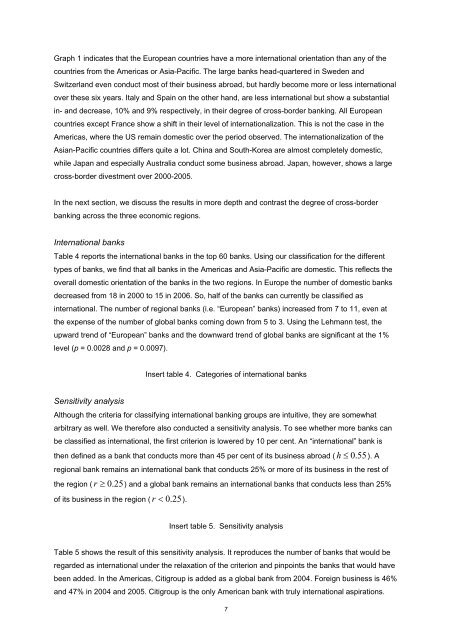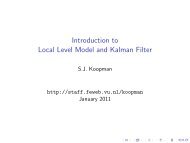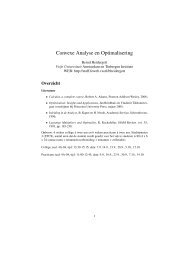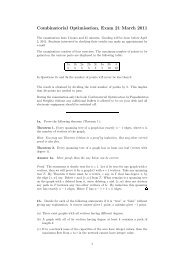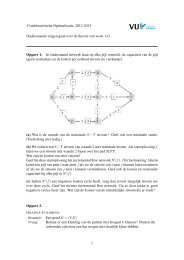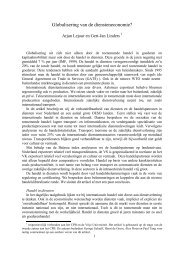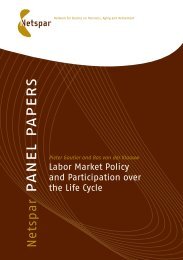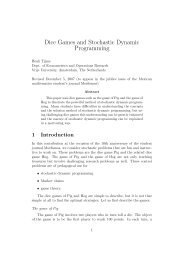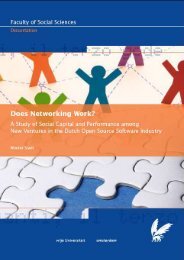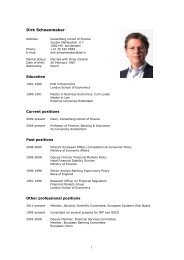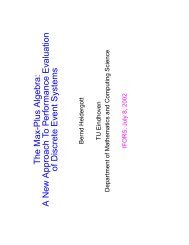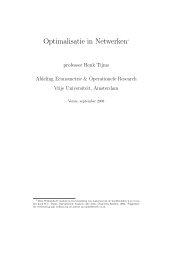Current State of Cross-Border Banking - Vrije Universiteit Amsterdam
Current State of Cross-Border Banking - Vrije Universiteit Amsterdam
Current State of Cross-Border Banking - Vrije Universiteit Amsterdam
Create successful ePaper yourself
Turn your PDF publications into a flip-book with our unique Google optimized e-Paper software.
Graph 1 indicates that the European countries have a more international orientation than any <strong>of</strong> the<br />
countries from the Americas or Asia-Pacific. The large banks head-quartered in Sweden and<br />
Switzerland even conduct most <strong>of</strong> their business abroad, but hardly become more or less international<br />
over these six years. Italy and Spain on the other hand, are less international but show a substantial<br />
in- and decrease, 10% and 9% respectively, in their degree <strong>of</strong> cross-border banking. All European<br />
countries except France show a shift in their level <strong>of</strong> internationalization. This is not the case in the<br />
Americas, where the US remain domestic over the period observed. The internationalization <strong>of</strong> the<br />
Asian-Pacific countries differs quite a lot. China and South-Korea are almost completely domestic,<br />
while Japan and especially Australia conduct some business abroad. Japan, however, shows a large<br />
cross-border divestment over 2000-2005.<br />
In the next section, we discuss the results in more depth and contrast the degree <strong>of</strong> cross-border<br />
banking across the three economic regions.<br />
International banks<br />
Table 4 reports the international banks in the top 60 banks. Using our classification for the different<br />
types <strong>of</strong> banks, we find that all banks in the Americas and Asia-Pacific are domestic. This reflects the<br />
overall domestic orientation <strong>of</strong> the banks in the two regions. In Europe the number <strong>of</strong> domestic banks<br />
decreased from 18 in 2000 to 15 in 2006. So, half <strong>of</strong> the banks can currently be classified as<br />
international. The number <strong>of</strong> regional banks (i.e. “European” banks) increased from 7 to 11, even at<br />
the expense <strong>of</strong> the number <strong>of</strong> global banks coming down from 5 to 3. Using the Lehmann test, the<br />
upward trend <strong>of</strong> “European” banks and the downward trend <strong>of</strong> global banks are significant at the 1%<br />
level (p = 0.0028 and p = 0.0097).<br />
Insert table 4. Categories <strong>of</strong> international banks<br />
Sensitivity analysis<br />
Although the criteria for classifying international banking groups are intuitive, they are somewhat<br />
arbitrary as well. We therefore also conducted a sensitivity analysis. To see whether more banks can<br />
be classified as international, the first criterion is lowered by 10 per cent. An “international” bank is<br />
then defined as a bank that conducts more than 45 per cent <strong>of</strong> its business abroad ( h ≤ 0.<br />
55 ). A<br />
regional bank remains an international bank that conducts 25% or more <strong>of</strong> its business in the rest <strong>of</strong><br />
the region ( r ≥ 0.<br />
25)<br />
and a global bank remains an international banks that conducts less than 25%<br />
<strong>of</strong> its business in the region ( r < 0.<br />
25).<br />
Insert table 5. Sensitivity analysis<br />
Table 5 shows the result <strong>of</strong> this sensitivity analysis. It reproduces the number <strong>of</strong> banks that would be<br />
regarded as international under the relaxation <strong>of</strong> the criterion and pinpoints the banks that would have<br />
been added. In the Americas, Citigroup is added as a global bank from 2004. Foreign business is 46%<br />
and 47% in 2004 and 2005. Citigroup is the only American bank with truly international aspirations.<br />
7


